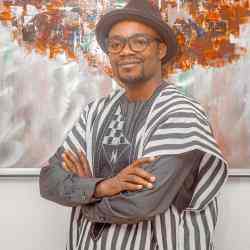Introdução
Pablo Capilé has created a model for a successful professional livelihood in music, art, and other cultural arenas based on collaboration and collective work as a viable alternative to the often-false hope of individual fame and fortune.
A nova ideia
Pablo builds a new orientation toward professional life among youth in Brazil by replacing ambition for individual wealth and fame with a work ethic centered on collective, interdependent activity, and modest consumerism. Pablo has identified some key professional arenas to put this fundamental shift into practice: Musical performance and production; theater; and more recently, sports. These fields are particularly characterized by the ideals of celebrity status and excessive consumerism—exactly what Pablo tries to counter with his Espaço Cubo (Cube Space).
Espaço Cubo draws young artists into an alternative economic system of “Cubo Cards,” with which they are paid for performances on an hourly basis. They can spend Cubo Cards on Espaço Cubo services. By benefiting from these shared services and joining together instead of competing, music and theater groups are more likely to realize their ambitions, attracting audiences in a way they would not alone. The more hours they work, the more financially viable they become, earning a small but sufficient income. This success effectively transforms youth into confident protagonists in their own lives—a lesson that along with an ambition redirected away from individual accumulation of wealth—will shape their futures, regardless of the professional paths they choose. Along with the Cubo Card system, Espaço Cubo also joins youth from different backgrounds in debate and action around the role of the state in promoting cultural activities.
Pablo continuously draws in new groups to Espaço Cubo through his “Off the Axis” network, which exists in 17 Brazilian states outside of the culturally dominant Rio—São Paulo region. Not only will he expand geographically, but, starting with sports and media production, he will include an ever-increasing array of professional arenas.
O problema
Broadly accepted images of success—music stars, popular actors, professional athletes—are often famous, wealthy individuals. Young people, especially those in marginalized communities’ peripheral to cultural centers, are left with an unrealistic set of expectations as they pave the way for their professional lives. In their attempt to move beyond the conditions in which they were raised, they have few alternative models for success other than individual accumulation of wealth and recognition. These unrealistic expectations for youth often lead to disappointment, low self-esteem, and a lack of professional progress. Youth in Brazil need opportunities to learn how to be healthy, productive professionals in other ways.
Young people’s choices regarding their professional lives are conditioned by the pressure to maximize their purchasing power as a measure of their success. Consumerism becomes the ultimate goal, and their diverse dreams, desires and talents are diminished in the process. Such a dynamic also compromises the quality and nature of the relationships youth create. They develop a “day by day individualism” characterized by the solitary and competitive search for economic success and the accumulation of wealth and goods, instead of cultivating social relationships and bonds.
Another symptom of the “cult of the celebrity” in Brazil has been the homogenization of cultural production. An increasingly narrow expression of arts and culture has meant that production is centered on limited genres in urban centers along the Rio de Janeiro—Sao Paulo axis. The cultural policies of the federal government also give priority to the southeast region with financial benefits and incentives, neglecting regions that are further from urban centers. Because of the lack of decentralized national cultural policies, access to the means of cultural production is unequal in Brazil. According to recent data from the Institute of Economic and Applied Research (IPEA) the metropolitan regions concentrate 41 percent of all cultural consumption. Furthermore, the richest 10 percent of the population are responsible for more than 40 percent of all consumption. Such a concentration of cultural production and consumption is leading to the gradual disappearance of varied local cultural expression.
A estratégia
Pablo has developed a set of activities to engage and reorient youth about what it means to be professionally successful. He chose musical performance and production as a starting place because of its appeal to youth and because its model of famous, wealthy individual success is in stark contrast to the model of collective productivity he promotes. Pablo is expanding his alternative system, Espaço Cubo, to include more and more professional arenas, such as theater, media production, and sports.
The essential tool Pablo has developed to promote collective professional activity is the Cubo Card, a unit of transaction that anyone in his Espaço Cubo network can use. Young artists from all socioeconomic backgrounds, aged 15 to 25, are paid for hours of performance in Cubo Cards, which they can use to buy rehearsal space, use of recording equipment, and communications/marketing for their performances and products. They are also increasingly able to use Cubo Cards to buy goods and services from restaurants and stores that Pablo is drawing into Espaço Cubo. Businesses benefit from increased sales brought by the Cubo Card network while at the same time, are given the opportunity to support the creative development of youth. Pablo created a basic chart to regulate the value of services and products exchanged in the Cubo Card system. This system fosters the production and consumption of cultural goods and services (such as CD production, media consulting, video clip production, rehearsal rooms and studios, visual aids, among others) while it engages small businesses and widens the market for the Cubo Card.
As Pablo has increasingly concentrated on marketing efforts for Espaço Cubo, it has become more popular with the general public. Performances draw growing audiences, who fund Cubo Cards with the real money they pay for admission to music festivals, theater performances, and sporting events. Because different music, theater, and sports groups are pooling their efforts, they are able to attract audiences they would not alone. This is especially true of groups that would not be immediately popular, say, because they are playing a genre of music outside the mainstream. This opens up the possibility of niche diversification, legitimizing a wider range of artistic expression and ensuring the continuation of local cultural forms outside the dominant centers of the Rio-Sao Paulo Axis. It also reinforces an ethic of interdependence, each artist relying on others to be individually successful.
Because musicians and performers are earning money by the hour and not according to popularity or political favors, Pablo is democratizing artistic patronage. If musicians and other performers (including athletes) work hard enough, they can earn sufficient income. In places where Espaço Cubo is most developed, they can buy almost everything they need to live with Cubo Cards. When this is true, Pablo’s point becomes clear: Through interdependent activity, young professionals can live off their ambitions. Rather than competition for individual success and riches won by very few, modest wealth is distributed to more people. As they work together to plan events and market them, youth increase their sense of empowerment and gain the skills they will need in the adult world, thereby enhancing their ability to lead successful and meaningful lives regardless of the career paths they choose to follow.
Not only does Pablo create tangible ways for youth to engage and see the value of productive professional activity, but he stimulates the debate that encourages them to think deeply about what they are doing. Through various venues such as music festivals and cultural events, groups from different parts of the country and different socioeconomic backgrounds have the opportunity to meet and interact. They talk about the arts as a political process, about how Brazilian policy affects the cultural scene, and alternative forms of expression, such as the hip-hop movement, and their link to broader cultural trends. Through this debate, art becomes a tool for social change. One young man heavily involved in Espaço Cubo went on to become, at age 26, the Secretary of Culture in the Brazilian state of Acre.
In the musical arena, where Espaço Cubo is most developed, Pablo has created an “Off the Axis Circuit” of bands; it originated in Cuiabá and is now present in 17 Brazilian states (North, Northeast and Center-West regions). He plans to create a national network that functions on the Cubo Card system, so that bands can travel freely to perform in any region. The network has expanded in part on its own, because it is so attractive to youth. Bands participate in music festivals and then go back to their communities and replicate the system. But Pablo also has a knack for earning the support of both the private sector and local governments in introducing Espaço Cubo in new locations. He convincingly demonstrates that he is stimulating creativity among youth, as well as enabling them to develop skills—such as event-planning and communications—that they will need to be productive members of the workforce.
Private and public sector organizations launch and support the network by paying for Cubo Cards in real money. This is the foundation of Espaço Cubo activities with 12 commercial business partners. By mapping the workforce and the products and services to be exchanged, Pablo is replicating the Cubo Card with partners such as “Central Única das Favelas” and Catraia Records.
Pablo is also introducing the Espaço Cubo system to younger children in schools. The Espaço Cubo marketing unit is working with schools to create media centers and school newspapers. In 2006, this initiative took place in 12 schools, and reached four more in 2007. This has proven to be an efficient way for Espaço Cubo to become known in new communities.
Pablo expects that in three to five years, the Espaço Cubo network will be sufficiently present throughout Brazil for him to turn his focus to expanding to other Latin American countries. In Brazil he will also continue to diversify the arenas of work in Espaço Cubo beyond music, theater, media, and sports.
A pessoa
Pablo was born in Cuiabá to a lower middle-class family. As the son of a historian father and a social worker mother, Pablo was engaged in Brazilian social and political issues from his earliest years. His interest in reading deepened his knowledge and served as a refuge during his childhood, since he felt discriminated and excluded during his school years at a private institution, until he found in art and theater a way to overcome this stigma and integrate in the school’s group. Having a strong understanding of respect and acceptance for the differences between his colleagues, Pablo managed not only to gain acceptance by his peers but became a great bridge-builder.
This aspect of his personality blossomed during his university years through his involvement in the student movement. Starting his law studies in 1999 at the University of Cuiabá, Pablo became close to students from the communication and publicity courses and decided to switch to publicity studies. He took on leadership roles at the Student Center, and took the initiative to gather several Student Centers together, especially from the Federal University of Mato Grosso. To him this link was fundamental to strengthen youth mobilization in the Center-West region.
Realizing it was necessary to offer effective alternatives to young people who dropped their studies and migrated to other regions of the country in search of better opportunities to study and work, Pablo created the first communication students’ meeting of the region, with the objective of exchanging experiences, deepening the relationships and organizing a mechanism of effective political pressure to increase the quality of higher education. In this way, he managed to place this otherwise marginalized region more centrally in the national student movement.
Although he considers students’ political mobilization important, Pablo felt the need to act outside the university to have freedom to build more effective mechanisms of change for youth. Noticing the importance of music in the student life, Pablo envisioned a way to engage and empower youth using music as an instrument of action. Recognizing the potential of mobilization and income generation, as well as the absence of structured action for promoting youth activities, Pablo created a recording and rehearsal studio; the seed that germinated into the Cultural Institute Espaço Cubo.




